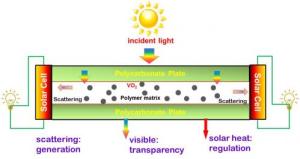 Scientists from the Chinese Academy of Sciences have designed a new generation of smart windows, made of materials that control the amount of incoming radiation from the sun, and have solar cells placed around the glass panels to generate electricity.
Scientists from the Chinese Academy of Sciences have designed a new generation of smart windows, made of materials that control the amount of incoming radiation from the sun, and have solar cells placed around the glass panels to generate electricity.
With this technology, the inventors claim that they can reduce cost related to temperature control throughout the year, while producing renewable energy at home.
Although many have claimed to have designed the perfect smart window, most products can only regulate light and heat coming from the outside, letting a lot of potential energy go to waste. Yanfeng Gao and his team tried to make use of this energy, developing a truly remarkable technology, presented in the latest issue of Nature Scientific Reports.
What makes their concept innovative and unique is the ability of their smart windows to generate and save energy at the same time. In their attempt to tackle the problem with transparency, instead of placing solar cells in the glass, the team fitted them around it. The glass part of the window is covered with vanadium oxide (VO2), which regulates incoming infrared radiation and changes its properties based on the temperature. In other words, the material can either isolate or reflect light, depending on how warm or cold it is outside.
To make the story complete, when in its reflecting mode, the VO2 scatters enough light to the solar cells to generate sufficient amount of electricity to power a light bulb.
This remarkable device combines everything that a window should be able to do in order to really be called “smart”. It saves energy, generates energy, and keeps you warm, or cool, exactly when you think that extreme temperatures have taken the best out of you.

































